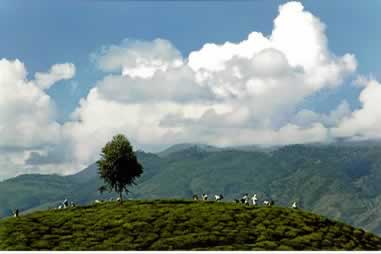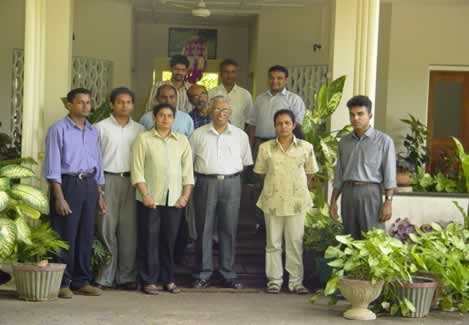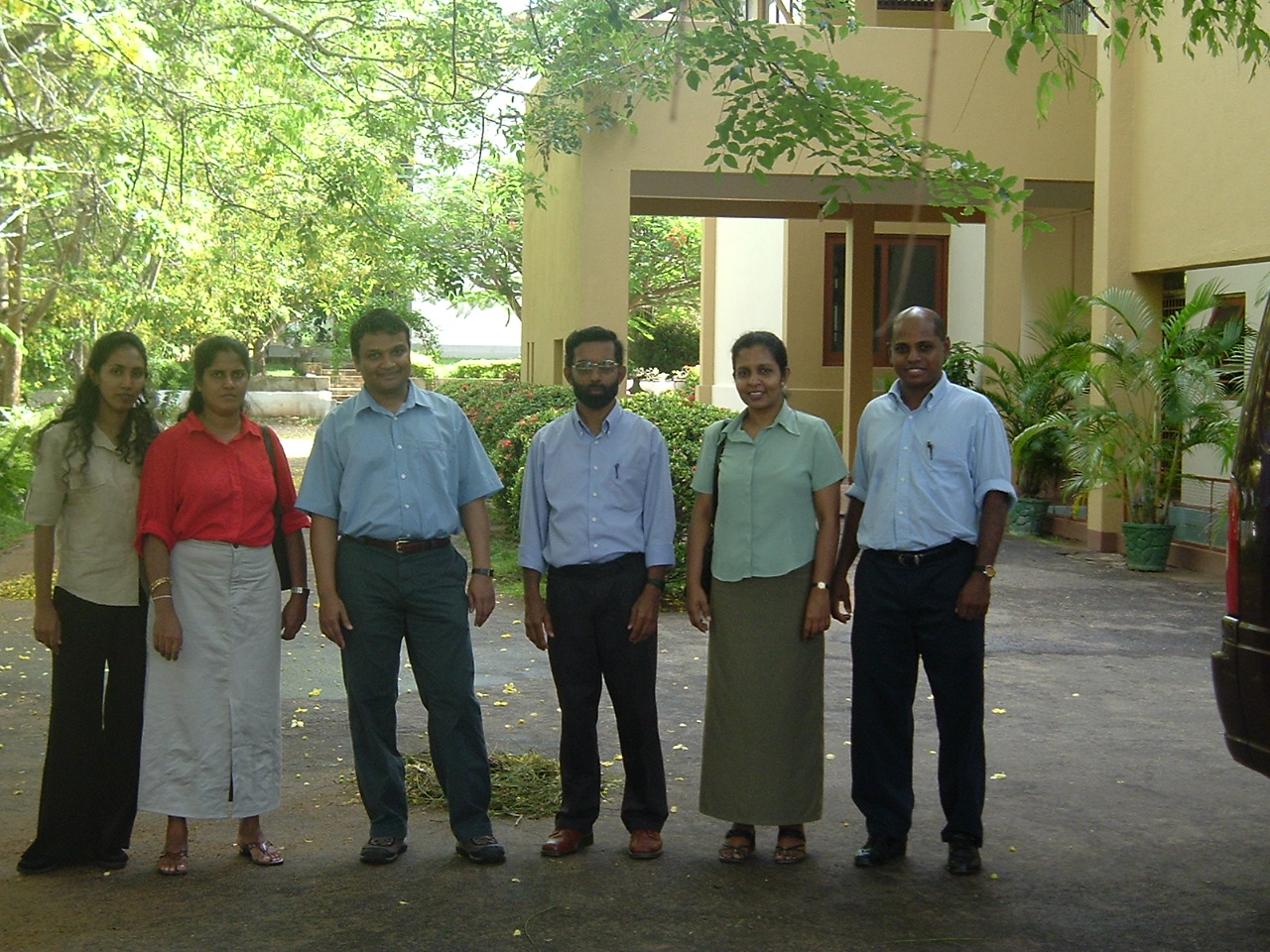Climate Change and Variability and Tea and Coconut Plantations in
Sri Lanka
Project Summary

Orographic clouds rise from the West of the
hill-country
of Sri Lanka over a Tea Plantation
The Project:
Tea and Coconut are among the important tropical plantation crops.
These crops are particularly vulnerable to climatic variability
and change. Coconut is vulnerable in particular to drought. Tea in Sri
Lanka derives its distinctive flavours and reputation for quality from
its particular regional and seasonal climatic history. Climatic
anomalies thus have a direct bearing on both Tea and Coconut. Over a
million people depend on plantations for their livelihoods in Sri
Lanka. Any decline in production or quality will have a direct impact
on both livelihoods and on the Sri Lankan economy. Tea and Rubber
accounted for 50% of national exports in 1986. A large fraction of the
tea production in Sri Lanka is undertaken within the Mahaweli basin.
How can these crop plantations cope with climatic variability and adapt
to climate change? That is the question that a multi-sectoral team of
scientists in Sri Lanka are seeking to answer. In doing so, they will
also in the process build capacity for climatic and crop modelling and
integrated assessment.
They are undertaking this project after garnering funding in 2002 for a
three-year project under the AIACC program of Global Environmental
Facility of the
United Nations Environment Program which is administered by global change SysTem
for Analysis, Research and Training (START) and the Third World
Academy of Sciences (TWAS).
A coconut plantation extends
The Partners:
The project team has been assembled by the
Sri Lanka Association for the Advancement of Science
(SLAAS) and comprises of scientists from the
Tea Research Institute
, Coconut Research Institute
, Department of Meteorology
, the University of Peradeniya
and Natural Resources Management Services of the Mahaweli Authority of
Sri
Lanka and the International Research
Institute for climate prediction (IRI).
All of these government agencies (apart for SLAAS and IRI) have a long
standing involvement in the plantation sector. The Tea and Coconut
Research
Institutes draw funds from the Plantation sector and are responsible
for research and extension services. The Department of
Meteorology is responsible for meteorological services and has lately
initiated
studies into climate change via the
Centre for Climate Change Studies. The University of Peradeniya has
conducted studies on solar radiation,
solar energy and applications in the tea plantation industry. The
Natural
Resources Management Services is involved as it capitalizes on a
collaborative
research with the IRI for two years with a focus on the upper
Mahaweli
catchment which overlaps with the tea plantations. It also has
specialized
expertise and resources in watershed management and geospatial mapping
for
the highlands of Sri Lanka.
Project Investigators After a meeting of the
project team at the Tea Research Institute, Ratnapura, June 2002
(Top Row: M.A. Wijeratne and A. Anandacoomraswamy, TRI, L. Zubair, IRI,
Middle Row: N. Fernando, CRI and TDMA Samuel, University of Peradeniya,
Bottom Row: J. Vithanage (Dept. of Meteorology, A. Jayakody, TRI, J.
Ratnasiri, SLAAS, S. Ranasinghe, CRI and T. Abeyrathne, Univ. of
Peradeniya)
Project Investigators After a
meeting of the project team at the Coconut Research Institute,
Lunuwila, Sri Lanka, September 2006
(L-R : Z. Yahiya and U. Tennakoon - FECT, L. Zubair, IRI and S. Peiris,
S. Ranasinghe and N. Fernando, CRI)
Project Progress:
This was a multi-partner project and our role was in
supporting the work in climate analysis and projections, crop-climate
modeling and synthesis of the results. Quality control of climate data
sets and assessment of climate change trends was undertaken. Assessment
of detailed climatologies of variables of interest at fine scales were
undertaken. Our work was in the domain of climate change,
crop-climate
interactions and contributions to synthesis. We have been able to make
significant contributions in research output and in capacity building,
which
are the goals of the AIACC project. Our contributions focussed more
on coconut than tea. Our partners have taken the lead on
the work on tea. The progress was reported via
bi-annual reports - our contributions are archived here along with our
contributions to the final project report.
Impact assessment and adaptation options need to
be informed by the best possible rigorous climate change estimation
procedures.
Through this project we have carried out work with the best available
methodology for data assimilation, data quality assessments, data
infilling,
data interpolation, current climate assessments, climate change
assessments and
climate scenario construction. All of this analysis was done with
maximum
efforts to obtain data within the limitations of the project funds and
what our
other projects could provide. This work
is an advance upon previous studies in that attention has been paid to
goodness
of data, robustness of estimates, significance testing and
incorporation of
physical parameters such as elevation in interpolation. These
show significant departures from
simple-minded climate change and even climate change estimates that had
been
previously used. We have also developed an improved algorithm to
estimate
national coconut production using climate information.
Communication
of Findings:
We have presented our work on climate change and
related issues in Universities, Mahaweli Authority, to post-graduate
students
in meteorology at the University of Colombo and post-graduate students
in oceanography and
water resources management at the University of Peradeniya. Project
partners at the Coconut Research Institute have operationalized the
prediction scheme
and the predictions are provided.
Two
journal articles have been published along with eight
conference abstracts. Lessons learnt from the project were
published
in two issues of the TIEMPO magazines from the University of East
Anglia.
One of these pieces was highlighted in the SciDev.Net website that is
sponsored
by the project sponsors, TWAS. Three
feature articles on climate change and data issues were highlighted in
several
Sri Lankan newspapers. Our final
project report was prepared and circulated.
Capacity Building
Four research assistants were supervised during
this grant, Mr. Heli Bulathsinhala and Ms. Kusalika Ariyaratne obtained
their
M.Sc. supported by this project. Two other research assistants Mr.
Irugal
Bandara and Ms. Manjula Siriwardhana
obtained extensive training in climatic data analysis, scientific
reporting and
project management.
IRI supports this effort intellectually and with the capability built
in Sri Lanka over a period of nine years through its projects. The
establishment of infrastructure, staff and funds for climate
research and use for decision making provides an example for sustained
capacity building. In practical terms, NRMS/FECT has obtained a
high-end PC and software, broad band internet access, three
research
assistants, support staff, and access to key data from the Department
of Meteorology, Tea Research Institute, Coconut
Research Institute and the University of Peradeniya. Intensive support
was provided during Dr. Sarath Peiris's visit to IRI for three
weeks, and Dr.
Neil Fernando's visit for a week to the IRI.




